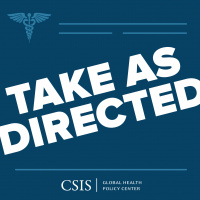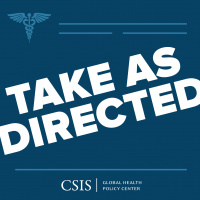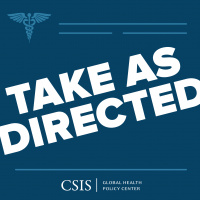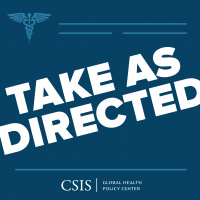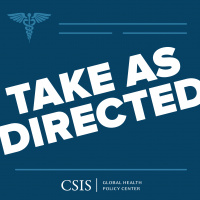Sinopsis
Take as Directed is the podcast series of the CSIS Global Health Policy Center. It highlights important news, events, issues, and perspectives in global health policy, particularly in infectious disease, health security, and maternal, newborn, and child health. The podcast brings you commentary and perspectives from some of the leading voices in global health and CSIS Global Health Policy Center in-house experts
Episodios
-
Coronavirus Crisis Update: More Than We Realized
24/02/2020 Duración: 16minThe Center for Strategic and International Studies (CSIS) is closely watching the coronavirus outbreak, also known as COVID-19, as it spreads quickly throughout China and around the world. As knowledge on COVID-19 evolves, Take as Directed will bring you the latest updates in this miniseries Coronavirus Crisis Update. CSIS’s Steve Morrison, Andrew Schwartz, and Jude Blanchette discuss the scientific, political, and economic ramifications of the virus with top experts in global health, China, international economics, and more.
-
Health Security Miniseries: CDC Director Rebecca Martin on the Global Health Security Agenda
11/02/2020 Duración: 31minLate last year, the CSIS Commission on Strengthening America's Health Security released its final report on ending the cycle of crisis and complacency in U.S. global health security. This miniseries of Take as Directed will delve into the detail of some of the Commission's recommendations. In this final episode of the miniseries, Steve talks with Rebecca Martin, Director of the Director of the Center for Global Health at the US Centers for Disease Control and Prevention (CDC). They discuss the CDC’s work on training field disease detectives and laboratory workers worldwide, how the CDC works across the world to respond to outbreaks, and the Commission’s recommendation that the US re-invest in Global Health Security Agenda (GHSA). They also discuss the CDC’s role in communicating credible science and evidence to children and to parents on social media.
-
Health Security Miniseries: Ambassador Jimmy Kolker and Carolyn Reynolds on Pandemic Preparedness Investments
05/02/2020 Duración: 27minLate last year, the CSIS Commission on Strengthening America's Health Security released its final report on ending the cycle of crisis and complacency in U.S. global health security. This miniseries of Take as Directed will delve into the detail of some of the Commission's recommendations. In this second episode of the miniseries, Steve talks with Ambassador Jimmy Kolker, former assistant secretary for global affairs at the US Department of Health and Human Services and a member of the Commission; and Carolyn Reynolds, senior associate at the Center. They discuss trends in global investment in health security, how countries have been preparing themselves for an outbreak, and the Commission’s recommendation that the World Bank establish a Pandemic Preparedness Challenge, that could incentivize countries to invest in their own preparedness.
-
Health Security Miniseries: CEPI CEO Richard Hatchett and New Technologies
14/01/2020 Duración: 39minLate last year, the CSIS Commission on Strengthening America's Health Security released its final report on ending the cycle of crisis and complacency in U.S. global health security. This miniseries of Take as Directed will delve into the detail of some of the Commission's recommendations. In this first episode of the miniseries, Steve talks with Dr. Richard Hatchett, CEO of Coalition for Epidemic Preparedness Innovations (CEPI). CEPI is a new model of partnership to finance and co-ordinate the development of technologies against high priority public health threats and emerging infectious diseases with pandemic or epidemic potential. Richard and Steve discuss the report's recommendation to systematically confront two urgent technology challenges: the need for new vaccines and therapeutics; and the public health communications crisis.
-
Gender-based Violence as a Weapon of War
17/12/2019 Duración: 30minThis episode examines the changing nature of war and conflict and why gender-based violence (GBV) has become a central feature in crises around the world. GHPC Senior Associate Janet Fleischman sits down with Melissa Dalton, senior fellow and deputy director of the CSIS International Security Program and Director of the Cooperative Defense Project (CDP); and Fatima Imam, executive director of Rehabilitation, Empowerment, and Better Health Initiative and Network of Civil Society Organizations in Nigeria. They discuss how GBV impacts women and girls in crises, focused especially on the Middle East and northern Nigeria, and how these ubiquitous and traumatizing realities undermine global health security and community resilience. This conversation is linked to a new CSIS report, How Can We Better Reach Women and Girls in Crises? and an October 31 conference on U.S. Action for Women’s and Girls’ Health Security, both under the auspices of the CSIS Commission on Strengthening America’s Health Security.
-
The New Threat - Making Sense of Vaccine-Derived Polio
03/12/2019 Duración: 22minIn this episode of Take as Directed, Nellie Bristol speaks with Dr. John Vertefeuille. Dr Vertefeuille is currently the polio eradication branch chief at the Centers for Disease Control and Prevention (CDC). His long career at the CDC has included stints in Haiti, Tanzania and Nigeria. Nellie and Dr. Vertefeuille discuss why there has been an increase in vaccine-derived polio since 2016, how it differs from wild poliovirus, and how the CDC plans to contain and prevent future outbreaks.
-
Saving Lives Through Global Immunization
21/11/2019 Duración: 24minOn September 27th, the CSIS Global Health Policy Center hosted a conference focused on Securing Healthy Populations in a New Era of Global Immunization. The program highlighted the progress that has been made in expanding access to immunization, but emphasized the need for a new push to increase global coverage from 85 to 100 percent. On this episode of Take as Directed, Senior Fellow Katherine Bliss walks through some of the conference panelists’ most striking comments and highlights the challenges of equity, trust, delivery, and insecurity that global immunization programs face as they develop new strategies for the next decade.
-
Malaria Eradication Within a Generation? How Plausible?
15/10/2019 Duración: 25minIn 2018, more than 200 million people contracted malaria around the world, and nearly half a million died of it. As countries continue to battle malaria within their borders, the international discussion turns to a loftier goal—complete global eradication of malaria. In this episode of Take as Directed, J. Stephen Morrison sits down with Sir Richard Feachem, Director of the Global Health Group at UCSF Global Health Sciences, and Professor of Global Health at both UC San Francisco and the UC Berkeley. They discuss the Lancet Commission on Malaria Eradication, and their new report that lays out a vision to achieve the eradication of malaria, “Malaria eradication within a generation: ambitious, achievable, and necessary.” Just how plausible is this vision?
-
Putin and Global Health: Friend or Foe?
02/10/2019 Duración: 29minIn the last decade, Russia has increased its global engagement, while at the same time pursuing policies at home that are giving rise to HIV/AIDS and drug-resistant tuberculosis epidemics that are a risk for its own populations, as well as its neighbors. These developments have unfolded against a backdrop of highly malevolent Russian behavior across many fronts that has resulted in the imposition of extensive sanctions. In this special joint episode of Take as Directed and Russian Roulette, J. Stephen Morrison sits down with Jeff Mankoff, Acting Director of the CSIS Russia and Eurasia Program; and Judyth Twigg, Professor of Political Science at Virginia Commonwealth University and a Senior Associate with the CSIS Russia and Eurasia Program. The three discuss Steve and Judy's recent analysis, “Putin and Global Health: Friend or Foe?” which outlines an opportunity to expand U.S. engagement to promote health security and counter Russian influence in Eastern Europe and Central Asia.
-
Rethinking Vaccine Delivery
17/09/2019 Duración: 21minWhile the world has seen tremendous improvement in the availability of life-saving vaccines, coverage rates have stagnated over the last decade. The U.S. government, a leading player in global immunization, is working with international organizations as they develop new strategies to accelerate progress toward global goals. On Friday, September 27th, CSIS will host a conference on global immunization to explore these issues. As a primer to that event, we take you back to a conversation from last winter between Nellie Bristol and Dr. Orin Levine, Director of Global Delivery Programs and former Director of Vaccine Delivery for the Global Development Program at the Bill & Melinda Gates Foundation. Dr. Levine joined us on this episode of Take as Directed to discuss new innovations in achieving equity, increasing demand for immunization, and reaching the unreached with vaccines to secure the health and stability of all populations.
-
Why Do Demographic Trends Matter for Global Health?
03/09/2019 Duración: 28minThe population of Africa is expected to double over the next 20 years, which means that many countries are facing either a demographic dividend or potentially a disaster, with critical implications for global health and development. In this episode of Take as Directed, Janet Fleischman sits down with Amb. Mark Dybul, Director of the Center for Global Health and Quality, and Professor in the Department of Medicine at Georgetown University Medical Center, and formerly head of the Global Fund to Fight AIDS, Tuberculosis, and Malaria. They discuss why these demographic trends matter and how U.S. programs can better engage young people, especially adolescent girls and young women, to address their needs and support local innovation.
-
The New Landscape for Gavi 5.0
20/08/2019 Duración: 23minAt the end of June, the Board of Gavi, the Vaccine Alliance, approved their new “5.0” strategy for 2021-2025, with an ambitious set of priorities for this new phase. In this episode of Take as Directed, Nellie Bristol sits down with Amanda Glassman, Executive Vice President and Senior Fellow of the Center for Global Development, and Katherine Bliss, Senior Fellow with the Global Health Policy Center, to discuss these changes and their implications for the broader immunization landscape beyond 2020.
-
Preparing Early Against Dangerous Pathogens
06/08/2019 Duración: 31minSince its inception in 2017, the Coalition for Epidemic Preparedness Innovations, or CEPI, has come to be seen as among the most promising innovations in global health security. It works to accelerate the development and introduction of new vaccines against known, dangerous pathogens, and to build common platforms for future development of vaccines. In this episode of Take as Directed, J. Stephen Morrison sits down with Richard Hatchett, Chief Executive Officer at CEPI, to discuss the organization’s origins following the West African Ebola outbreak in 2014-15, and its further evolution two years into its mandate.
-
Unpacking the DRC Ebola Crisis with Jason Stearns
16/07/2019 Duración: 26minIn this episode of Take as Directed, J. Stephen Morrison sits down with Jason Stearns, Director of the Congo Research Group at the Center for International Cooperation at New York University. Jason is among America’s premier experts on Congolese politics and economics. In this episode, he shares his astute insights into the opaque networks in eastern Congo which are deliberately and violently targeting health providers, paralyzing the international and local response to the Ebola outbreak. This is the second of a pair of episodes that examines what steps are now essential to end violence and win community trust and confidence in eastern Congo.
-
Unpacking the DRC Ebola Crisis with David Gressly
09/07/2019 Duración: 27minIn this episode of Take as Directed, J. Stephen Morrison sits down with David Gressly, the UN Emergency Ebola Response Coordinator in the Democratic Republic of the Congo (DRC). Gressly was appointed in May by the UN Secretary General to lead a more strategic, coordinated, and better funded effort to arrest the dangerously escalating Ebola outbreak. This is the first of a pair of episodes that examines the root causes of targeted violence against health providers and active community resistance, and what steps are now essential to end violence and win community trust and confidence.
-
Innovation and Optimism: A Conversation with Dr. Trevor Mundel
27/06/2019 Duración: 32minIn this episode of Take as Directed, J. Stephen Morrison speaks with Dr. Trevor Mundel, President of the Global Health Division at the Bill & Melinda Gates Foundation. They discuss the arc of Dr. Mundel’s personal career and his remarkable tenure at the Gates Foundation, including the creation of the Medical Research Institute; the launch of CHAMPS, the Child Health and Mortality Prevention Service; and the establishment of CEPI, the Coalition for Epidemic Preparedness Innovations. In closing, they discuss the issues that give him the greatest concern, and the reasons he is hopeful looking to the future.
-
Geeta Rao Gupta on Gender Equality and Health
25/06/2019 Duración: 31minIn this episode of Take as Directed, host Janet Fleischman sits down with Geeta Rao Gupta, executive director of the 3D Program for Girls and Women, former president of the International Center for Research on Women (ICRW), and former Deputy Executive Director of UNICEF. They discuss the new series of The Lancet, of which Geeta was a principal author, that outlines the impact of gender norms and inequalities on health, describes persistent barriers to progress, and provides an agenda for action. They also discuss the recent Women Deliver conference in Vancouver and how to maintain optimism for the future.
-
Politics, Health, and Humanitarianism: The Role of UNRWA
12/06/2019 Duración: 30minIn this episode of Take as Directed, Sara Allinder is joined by special guest host Haim Malka, Deputy Director and Senior Fellow of the CSIS Middle East Program, to discuss the future of the United Nations Relief and Works Agency for Palestine Refugees in the Near East (UNRWA). The two interview Dr. Akihiro Seita, Director of Health and WHO Special Representative for UNRWA, and Elizabeth Campbell, Director of UNRWA’s Washington D.C. office, about their concerns for Palestinian refugees’ health as humanitarian aid declines amid continuing political uncertainty in the region.
-
Vaccine Confidence in Crisis
28/05/2019 Duración: 29minIn this episode of Take as Directed, J. Stephen Morrison speaks with Dr. Heidi Larson, Director of the Vaccine Confidence Project at the London School of Hygiene and Tropical Medicine. They discuss why vaccine confidence is currently in crisis, and how this has fueled outbreaks such as measles and the persistence of polio in Afghanistan and Pakistan. Plus, Dr. Larson walks through her work with the Vaccine Confidence Project, including monitoring public confidence in immunization programs and building an information surveillance system for early detection of public concerns around vaccines.
-
Global Diets and the Risk of Disease: Evaluating Eating Habits Around the World
14/05/2019 Duración: 26minIn this episode of Take as Directed, Steve Morrison speaks with Dr. Christopher Murray, Director of the Institute for Health Metrics and Evaluation (IHME) of the University of Washington. Dr. Murray walks through IHME’s ongoing Global Burden of Disease analysis, as he and his team have been evaluating eating habits and food systems for people in 195 countries. Dr. Murray shares the study’s most important—and surprising—findings about global diet-related issues.


